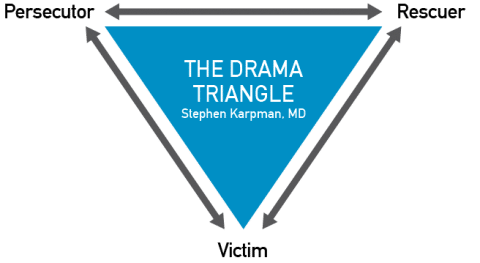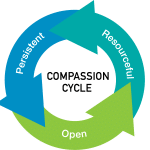
Sharing Responsibility For Learning Outcomes
Share viaI’m writing this post on the heels the 2018 Association for Challenge Course Technology International Conference in Ft Worth Texas, where I delivered the opening keynote and a workshop on how positive and negative conflict manifest in facilitation.
In general, people don’t like conflict. The challenge course industry is no different. The majority of participants who came to my workshop and our exhibit booth agreed that they struggle with conflict too, even though most of them are in the business of helping people get along better. In the last year we surveyed nearly 2000 people in the general public about their response to conflict. 72% of all participants say they choose compromise to avoid conflict. Nearly one third habitually slip into drama.
Drama is what happens when we fall into one of three behavioral roles and seek justification for our behavior while losing sight of effectiveness. It’s called the Drama Triangle.

The Persecutor assumes the position that they are OK, others are not, so they feel justified in using intimidation, guilt, blame, and attacks to get what they want. Victims assume the opposite position, putting themselves down and inviting criticism. Rescuers overthink and over-do for others with unsolicited advice, violating another person’s autonomy and free choice while creating dependence.
Training and Development professionals aren’t immune from drama. We surveyed over 500 L&D professionals at the 2016 and 2017 ATD international conferences using our Drama Resilience Assessment (DRA), an online assessment of a person’s risk for each of the three drama roles, as well as their capacity to choose a more constructive course of action. Participants in our survey exhibited the highest risk on Rescuer role. Rescuers often have an air of superiority with an attitude of “I know what’s best for you.” The next most common role was Victim. Many professionals we spoke with described how they switch from Rescuer to Victim if their help isn’t appreciated or their efforts backfire. Many described their bosses as the Persecutor!
There’s a better way. It’s called Compassionate Accountability®; blending kindness, care, and concern with attention to results and boundaries. Compassionate Accountability replaces the roles of Victim, Rescuer, and Persecutor with the skills of Openness, Resourcefulness, and Persistence to create a learning environment where responsibility for learning outcomes is shared, in a spirit of dignity.
Compassion means “to struggle with others” in a spirit of dignity and respect.

Openness is about confident transparency and support. Open people share their feelings and disclose their motives. They validate and accept others’ feelings and motives. Openness supports an environment of safety where the real issues get talked about, reinforcing the message, “We are worthwhile.”
Resourcefulness is about creative problem-solving, engaging people collaboratively to find the best solution. Resourceful people put their ego aside so that they can learn from failure and avoid getting invested in their own solution. Resourcefulness supports an environment of curiosity, reinforcing the message, “We are capable.”
Persistence is about boundaries, principles, and commitment. Persistent people keep promises, uphold their principles, and encourage others to follow through on commitments without attacking or blaming. Persistence supports an environment of consistency, reinforcing the message, “We are accountable.”
Putting it all together, L&D professionals can change how they relate to co-learners by using all three skills to engage conflict without casualties. Can you see the Open, Resourceful, and Persistent components of this statement below?
I feel anxious about where we are in the curriculum today. I’d really like to make it through section two before 4 PM and we are a little behind. What ideas do you have for catching up? I’m committed to covering the material in the most helpful way possible.
I’m feeling defensive because I care deeply about this topic and want to be helpful. When you questioned my credentials in front of the group, I took it personal. I’d like to explore other ways of getting feedback. It’s important to me to preserve my dignity while being open to constructive feedback.
A mentor once told me, “If you are doing more work than your client, you’re doing something wrong.” Practice compassionate accountability to share the load.
Copyright Next Element Consulting, 2018
Get the book, Conflict Without Casualties!
Develop your Compassionate Accountability Skills
Get Certified to deliver Compassionate Accountability
Get connected with Next Element!
Book Your Next Keynote Speaker

Author and Co-founder of Next Element, Dr. Nate Regier is available to speak at your upcoming event.
Submit a Speaker RequestPodcast: Listen to Nate "On Compassion"
 Listen to the Podcast
Listen to the Podcast



0 Comments
Add comment